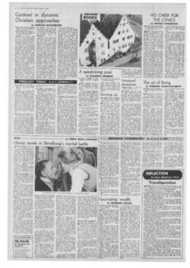Page 5, 1st August 1969
Page 5

Report an error
Noticed an error on this page?If you've noticed an error in this article please click here to report it.
Tags
Share
Related articles
Latin Mass Leaders Quit Over Policy
Change And Decay
Pope Lifts Ban On Ridentine Rite
Latin, Yes – Tridentine, No
Variety In The Liturgy
Fostering ancient rite
THE decision of the Latin Mass Society "to press for the retention of the Tridentine Mass" is a decision to press for the observance of the decrees of the Vatican Council.
The "Constitution on the Sacred Liturgy" says that (4) "In faithful obedience -to tradition the Sacred Council declares that Holy Mother Church holds all lawfully acknowledged rites to he of equal right and dignity: that she wishes to preserve them in the future and to foster them in every way."
Therefore, the Roman rite, being a lawfully acknowledged rite, has an equal right to re main in use as any other rite. "The Council," says this Con stitution (4) "also desires that where necessary the rites be revised in the light of sound tradition" and (23) "there must be no innovations unless the good of the Church genuinely and certainly requires them."
If those who have been working on the liturgy since the closure of the Council had observed these rules more strictly we might have received from their labours a "revised Roman Rite" instead of a "New Roman Rite." In fact, we have now received a New Roman Rite especially designed for a vernacular dialogue Mass. This New Rite, authorised for use on November 30, 1969.
should not oblige us to allow the old rite to fall into disuse. The old Roman Rite, whose language is Latin, is the universal rite of the Latin Church and was declared legal for all time by Pope St. Pius V in 1570.
It is a rite that has been in us z and little changed during the last thousand years, giving infinite satisfaction to the whole Latin Church. The Latin Mass Society desires to "foster" this ancient rite in the Latin tongue.
G. Houghton Brown Latin Mass Society Representative for the Diocese of Westminster London, W.C.1
IT should, I think, be made clear that the officers and committee of the Latin Mass Society, in pursuing a policy of pressing for the retention of the Tridentine Mass, as was reported in your columns on July 18, in no way challenge the authority of the Apostolic Constitution of April 3.
Nor can they, in the nature of things, express any judgment on the value of new forms which are as yet untried. They see their task as the safeguarding of the values of that venerable form to which the Supreme Pontiff has himself paid glowing tribute.
Alexandra Zaina Liverpool University.
THE letter from Hugh Ross Williamson (July 18) about the significance of the Tridentine Mass came like a breath of fresh air. The importance of retaining the Tridentine Mass for its value to the unity of the Church was surely never more obvious than at the present time.
To many Catholics it is something more than just a coincidence that the "upheavals" within the Church in many countries — with the implied danger of schisms — should have come about during roughly the period when there has been so much meddling with the liturgy and, in particular, the familiar Latin Mass.
Brian Gilshenan London, S.W.5.
blog comments powered by Disqus









